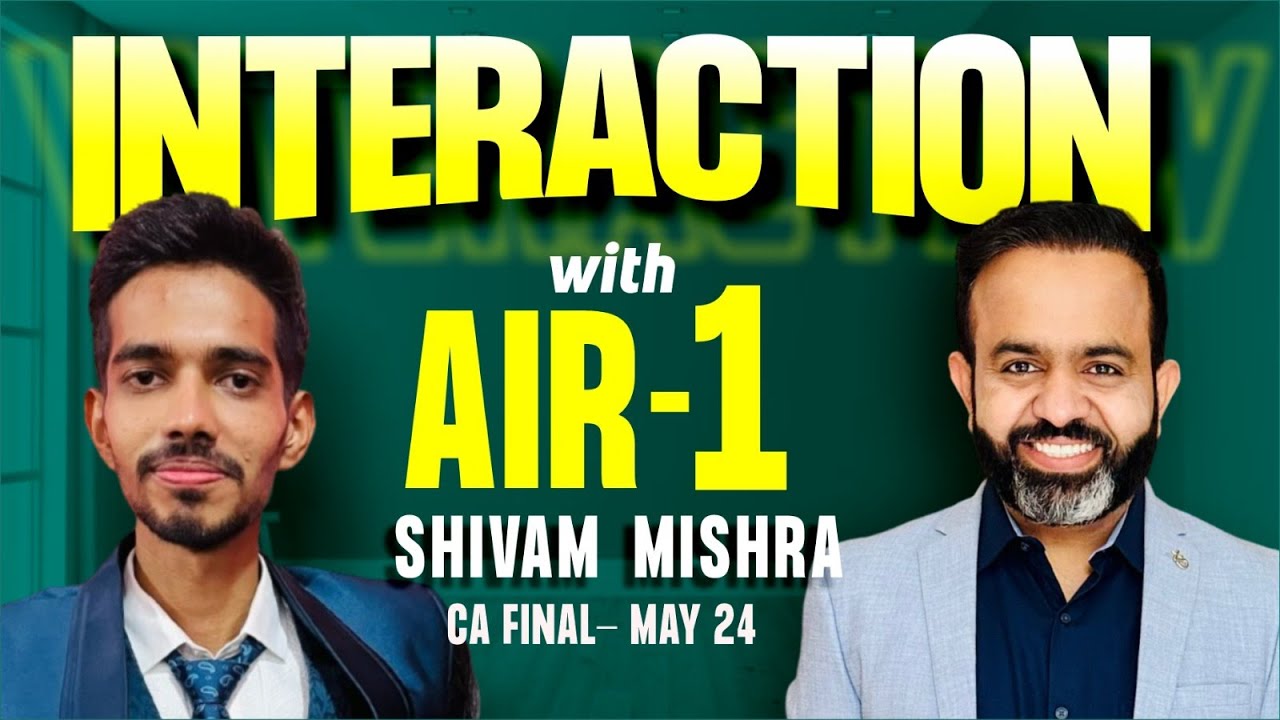AIR 14 in CA Final May 25 – Here's Exactly What I Did
Summary
TLDRIn this video, Kewal Dhatiya, who secured an All India Rank 14 in the CA finals, shares his study strategies and time management tips for CA exams. He emphasizes the importance of quality over quantity in revisions, recommends effective resources for different subjects like FR, Audit, DT, and IDT, and advises a balanced approach to learning. Kewal highlights the significance of daily practice for Audit, solving practice questions for DT, and revising key topics for IDT. He also suggests staying motivated by having study partners and taking breaks for better mental clarity.
Takeaways
- 😀 Focus on the quality of your revisions, not just the number of revisions. A minimum of three well-executed revisions is sufficient.
- 😀 Allocate at least 8-12 days for each of the first two revisions of a subject to ensure a thorough understanding.
- 😀 For Financial Reporting (FR) and Advanced Financial Management (AFM), solving problems from Bhavik Chokshi's book is essential. Make sure to attempt all sums and practice writing solutions.
- 😀 For Audit, consistency is key. Dedicate 3 hours every day to auditing and focus on learning professional ethics, emerging areas, and Caro clauses by heart to secure 20-25 marks.
- 😀 Audit requires continuous daily effort. Don't leave it all for the last minute; engage in small revisions every day.
- 😀 In Direct Taxation (DT), complete your first revision in detail without rushing. Bhavar Burana’s book is highly recommended, along with solving practical problems multiple times.
- 😀 Indirect Taxation (IDT) requires a structured approach. Follow Yashwant Mangal’s detailed and summary books, and solve questionnaires at least twice during each revision.
- 😀 For International Business Studies (IBS), go through at least 20 case studies in the weeks leading up to the exams, and practice solving MCQs related to them.
- 😀 Discussing subjects with serious study partners is crucial for maintaining motivation and reducing stress. Take breaks and study together to keep the momentum going.
- 😀 Allocate time for multiple revisions, and balance your studies with some fun. Be sure to find a study group where you can have light moments while staying focused.
Q & A
How many revisions did the speaker suggest for preparing for exams?
-The speaker suggests focusing on quality over quantity when revising. While at least three revisions are recommended, each revision should be thorough and should ideally take 8 to 12 days per subject.
What is the key approach to revision according to the speaker?
-The key approach to revision is not focusing on the number of revisions, but on the quality of each revision. It’s important to allocate sufficient time (10-12 days) for each revision and to ensure a deep understanding of the subjects.
Which resources did the speaker recommend for Financial Reporting (FR) and Advanced Financial Management (AFM)?
-The speaker recommends using Bhavik Chokshi’s book for both FR and AFM. The book covers RTP, MTP, and past papers from the last five to six years, which helps in thoroughly understanding the subject.
What specific strategy did the speaker suggest for auditing preparation?
-For auditing, the speaker recommends studying every day. Specifically, Shubham Keshwani’s book is suggested for audit preparation, with a focus on Professional Ethics, Emerging Areas, and Caro chapters, which should be memorized to score at least 20-25 marks in the exam.
What approach did the speaker take for Direct Taxation (DT) preparation?
-For DT, the speaker recommends using Bhavar Burana’s lectures and book. The focus should be on reading the concepts and solving practical questions at least twice. The speaker emphasizes taking time with the first revision to thoroughly understand each topic.
How did the speaker suggest preparing for Indirect Taxation (IDT)?
-The speaker recommends using Yashwant Mangal Saras’ lectures and books for IDT. For the first and second revisions, the speaker advises using the main book and the summary book, and solving the questionnaire at least twice during each revision.
How did the speaker approach preparation for the Integrated Business Strategy (IBS) subject?
-The speaker suggests reviewing at least 20 case studies for IBS. Additionally, practicing multiple-choice questions and solving case studies is crucial for understanding the subject better.
What was the speaker’s strategy for preparing for Law?
-For Law, the speaker used Harsh Gupta’s book, which was helpful for MCQs. The speaker focused on preparation using this book, especially for the SPOM (Specific Purpose of Management).
What advice did the speaker give regarding studying with friends during study leave?
-The speaker recommends studying with serious, like-minded friends. Discussing study topics, especially audit clauses, in the library at night with friends can help reduce stress and enhance learning through group discussions.
What did the speaker mention about preparing for Costing?
-For Costing, the speaker did not dedicate a specific time for it. Instead, they focused on reading the module a day before the exam and used printed indexes to quickly find concepts during revision.
Outlines

This section is available to paid users only. Please upgrade to access this part.
Upgrade NowMindmap

This section is available to paid users only. Please upgrade to access this part.
Upgrade NowKeywords

This section is available to paid users only. Please upgrade to access this part.
Upgrade NowHighlights

This section is available to paid users only. Please upgrade to access this part.
Upgrade NowTranscripts

This section is available to paid users only. Please upgrade to access this part.
Upgrade NowBrowse More Related Video

Interview with CA FINAL AIR - 1 Shivam Mishra l MAY 2024 l CA Bhanwar Borana

My CA Journey - AIR 1 CA Final May'24

CA Inter AIR-1 Topper Podcast With Alakh Sir

CA Foundation September 2025 Strategy for All Subjects | Masterplan | #cafoundation #icai #class12

CA in Dubai | EP - 04

AIR 258 In NORCET_7 With Just 3 Months Preparation🤞Shares NORCET 8 Preparation Strategies & Tips🙂
5.0 / 5 (0 votes)